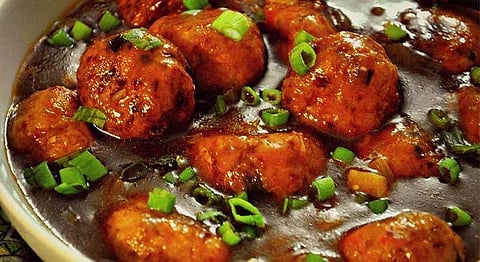How A Cricket Club Gave Birth To India’s Favourite Chicken Manchurian
I think I speak for a majority of Indians when I say this, Indians love Indian-Chinese food. From spring rolls, to Chowmein, to all things Szechwan, the cuisine has been an Indian favourite for ages. Of course, there’s been one constant preference for us all when it comes to Indian-Chinese – gravy with a thousand flavours making a chaos around perfectly fried chicken pieces, usually enjoyed with a neat helping of fried rice at the side. Yes, we’re talking about the scrumptious, stunning Chicken Manchurian.
You already know just how delicious it is, but we’re here to tell you about its history; about the mysterious origins of the tiny piece of heaven that is the Chicken Manchurian.
Mumbaikars, rejoice – this dish was made in your very city, back in 1975, by the founder of the still renowned China Garden, Nelson Wang. Born in 1950, Wang was the son of a Chinese immigrant, and came to Bombay in 1974 to pursue his dream of becoming a chef. When he began his career working as a caterer at the Cricket Club of India, a customer asked him to create an off-the-menu dish – something unique and never made before. Wang returned to the kitchen, coated cubes of chicken with cornstarch, fried them, and added them to a garlic, ginger and green chilli-based sauce – ingredients that were essentially Indian, along with soy sauce. Word spread about this curious new dish. Little did he know that his dish would receive so much appreciation that he would be encouraged to establish his own restaurant. Thus arrived China Garden, Bombay’s original Indian-Chinese restaurant and the consequent, rapid fame that the Chicken Manchurian was to receive.
Chicken Manchurian has since expanded rapidly, to all corners of the country, as has China Garden. Wang’s son, Eddie, has given himself the responsibility of opening up chains of the restaurant in Bangalore, Goa, Pune, Hyderabad and Delhi. Chicken Manchurian has found itself a comfortable place on the menu of seemingly every Indian-Chinese restaurant, and has even branched out to different versions of itself to cater to its immense fan-following – Vegetable Manchurian and Gobi Manchurian have also become increasingly popular. Nelson Wang, we owe everything to you for bestowing upon us the blessing that is the Chicken Manchurian.
If you liked this article, we suggest you read:


